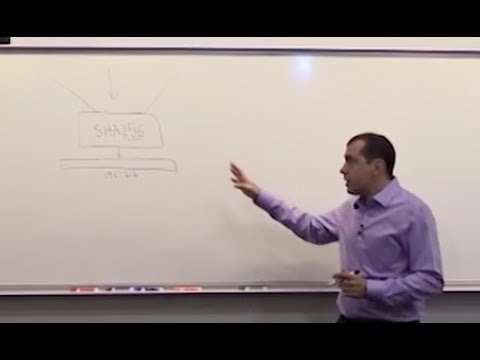An academic lecture by Andreas M. Antonopoulos explaining the consensus algorithm, “Proof of Work”, used by bitcoin and many other blockchains. Andreas is a UCL alum.
This talk was presented in collaboration with the Department of Computer Science at University College London.
If you want early-access to talks and a chance to participate in the monthly live Q&As with Andreas, become a patron: https://www.patreon.com/aantonop
RELATED:
What is Consensus: Rules without Rulers – https://youtu.be/2tqo7PX5Pyc
Bitcoin Security: Bubble Boy and the Sewer Rat – https://youtu.be/810aKcfM__Q
Bitcoin, A New Species of Money: An Evolutionary Perspective on Currency – https://youtu.be/G-25w7Zh8zk
Measuring Success: Price or Principle – https://youtu.be/mPMsbgWl9p4
Why Open Blockchains Matter – https://youtu.be/uZPIz3ArQww
Decentralised Globalisation – https://youtu.be/QoiR4aNbTOw
Investing in Education instead of Speculation – https://youtu.be/6uXAbJQoZlE
Beyond Price: Bitcoin’s Impact on the Future – https://youtu.be/rvwVbRQ5Ysc
How does the Blockstream satellite work? – https://youtu.be/C1GxxlqRkKQ
Regulation and the bank boycott – https://youtu.be/8ypH69Cb1l0
Remittances and smuggling in Venezuela – https://youtu.be/RRXecXfWARw
Bitcoin as everyday currency – https://youtu.be/xYvvSV4mjH0
What is the appeal of sound money? – https://youtu.be/tfba4FFErrQ
Hyperbitcoinization – https://youtu.be/AB5MU5fXKfo
Why permissioned blockchains fail – https://youtu.be/GEQzlJ_WL-E
Protocol development security – https://youtu.be/4fsL5XWsTJ4
How to avoid re-creating systems of control – https://youtu.be/EfoGnDoaBL8
Wallets, nodes, and monetary sovereignty – https://youtu.be/8Hb3tUn8s4E
Is bitcoin testing governments? – https://youtu.be/UfRGo2LAIpo
Will governments let privacy coins exist? – https://youtu.be/30sjEW70rLE
Geopolitics and state-sponsored attacks – https://youtu.be/htxPRTJLK-k
Governance and social attack immunity – https://youtu.be/PjOHatoX6Fk
Sanctions and censorship resistance – https://youtu.be/DeXe5eGRl7E
State-sponsored digital currencies and trust minimization – https://youtu.be/dSpFbg7jlDw
Taxation and failed societies – https://youtu.be/xspdlOtBjcE
Andreas M. Antonopoulos is a technologist and serial entrepreneur who has become one of the most well-known and respected figures in bitcoin.
Follow on Twitter: @aantonop https://twitter.com/aantonop
Website: https://antonopoulos.com/
He is the author of two books: “Mastering Bitcoin,” published by O’Reilly Media and considered the best technical guide to bitcoin; “The Internet of Money,” a book about why bitcoin matters.
Subscribe to the channel to learn more about Bitcoin & open blockchains; click on the red bell to enable notifications about new videos!
MASTERING BITCOIN, 2nd Edition: https://amzn.to/2xcdsY9
Translations of MASTERING BITCOIN: https://bitcoinbook.info/translations-of-mastering-bitcoin/
THE INTERNET OF MONEY, v1: https://amzn.to/2ykmXFs
THE INTERNET OF MONEY, v2: https://amzn.to/2IIG5BJ
Translations of THE INTERNET OF MONEY:
Spanish, ‘Internet del Dinero’ (v1) – https://amzn.to/2yoaTTq
French, ‘L’internet de l’argent’ (v1) – https://www.amazon.fr/Linternet-largent-Andreas-M-Antonopoulos/dp/2856083390
Russian, ‘Интернет денег’ (v1) – https://www.olbuss.ru/catalog/ekonomika-i-biznes/korporativnye-finansy-bankovskoe-delo/internet-deneg
Vietnamese, ‘Internet Của Tiền Tệ’ (v1) – https://alphabooks.vn/khi-tien-len-mang
MASTERING ETHEREUM (Q4): https://amzn.to/2xdxmlK
Music: “Unbounded” by Orfan (https://www.facebook.com/Orfan/)
Outro Graphics: Phneep (http://www.phneep.com/)
Outro Art: Rock Barcellos (http://www.rockincomics.com.br/)
source











Dr Andreas me perdoe e algo fiz centros supletivo s com problema de saúde deste criança são estudos………se formar desocupado e algo sério livros dor cabeça ética segurança saúde costas peso desobediência e perto portão rua como chá ? Pede pedra sopa receita.? Hoje como pessoas com perdas de espaço aceita café?
This is awesome.
Andreas is a true genius! One can easily detect that, not from his deep knowledge on the subject, but from the humility with which she shares it with others! Standing applause!
So do the Forks keep us safe in the long run
Recorded by IamSatoshi?
Mac Terminal:
hasum <<< 'Hello!'
a8d191538209e335154750d2df575b9ddfb16fc7
shasum <<< 'Hello!0'
0e0978c3bcd55ccb10ef61aa900adee01c512d5e
shasum -a 256 <<< 'Hello!'
b22b009134622b6508d756f1062455d71a7026594eacb0badf81f4f677929ebe
shasum -a 256 <<< 'Hello!0'
7460100bc6dcc237f60b0b47c27c731ea41b64fb5462e2e4c2dd33d5f57f7fe9
Watching this in 2019 gives me a real feeling of how tech evolves! This was recorded when BITCOIN CASH was still a theory without a name yet, we have two bitcoin cash now! lightning network was still alive only in theory, we have payment channels funded with 1 BTC currently and still growing! Truly bullish on the future of crypto!!?
Thank you…anto…
Don't know what the guy put in his sha256 function, but it was not that phrase. A8D19 is not what I'm getting… 🙂
334d016f755cd6dc58c53a86e183882f8ec14f52fb05345887c8a5edd42c87b7
Thank you Andreas for such a clear explanation!
@aantonop don't you think that consensus rule about the longest chain leads to mining concentration in a certain region ? I appreciate your feedback
After reading Forbs and Verge article I have some doubt what Consensys and Joe Lubin doing with crypto future
https://www.theblockcrypto.com/tiny/the-verge-consensys-could-be-laying-off-as-many-as-50-60-of-its-employees/
26:36 Who sets the validation rules? I disagree with your answer here Andreas! I think the answer is simply 'consensus' (and all that that implies). Discussing reference implementation and core implementation may be technically correct, but it's conceptually wrong. kthxbi
Consensys is on the way down according to Verge article, Forbes article declared Joe Lubin incompetent
https://www.theblockcrypto.com/tiny/the-verge-consensys-could-be-laying-off-as-many-as-50-60-of-its-employees/
is bitcoin could be forked into post quantum cryptography
what do you think of hashgraph?
those guy in first row so bored. how it even possible when you attending absolutely fascinating lecture. I'm dreaming to learn this those days.
How about kris kringle combine b-cash and satoshi Bitcoin to create peer to peer kringle cash ?
Best Tube ever!!! I learned so much
Andreas, you have such a fantastic way of explaining things in the most clear, simple, precise, and non-arrogant way. People love you because you are clearly a genius but you don't make your listeners feel dumb. Bravo sir.
just for people who wonder, the guy in the room gave the sha-1 hash, not the sha256 hash, he run the command wrong (i guess using mac, where default is sha-1 from the shasum command)
If you are in search for some good technical explanations about Bitcoin, this video is a must watch. Hats off to Andreas !!
blockchain seems intelligent but it is not the future
what a nightmare of doing things
it is not good
it is like coal
we already have better systems
Great talk and finally someone that can explain the details.
Everyone in this room is now rich or stupid!
ty
Best video on POW on YouTube … Best work by Andreas
Absolutely dynamite talk, at this point these more technical ones are the ones I enjoy the most.
and as i understood if you're not moving your coins during these forks, your funds are safu) right?
so all the race are for the Zeros. or any particular line of same numbers in the begining of hash. could it be a line of "1111jhdihwbvih…"? or"…ijwdhgviwfh000000000"?. I'm wondering what the reason behind chosing "zeros before hash" as a main cryteria?? is it the hadrest combination to find somehow?
At the time of race condition how the reward system work?
Interesting extreme bi-forkation event at 54:40
what if after fork also both forks generate one more block, then what happen to transactions in orphan Block?
How a node agrees to particular nonce? and Who exactly maintains this nonce value.
Brilliant explanation. Great work Sir.